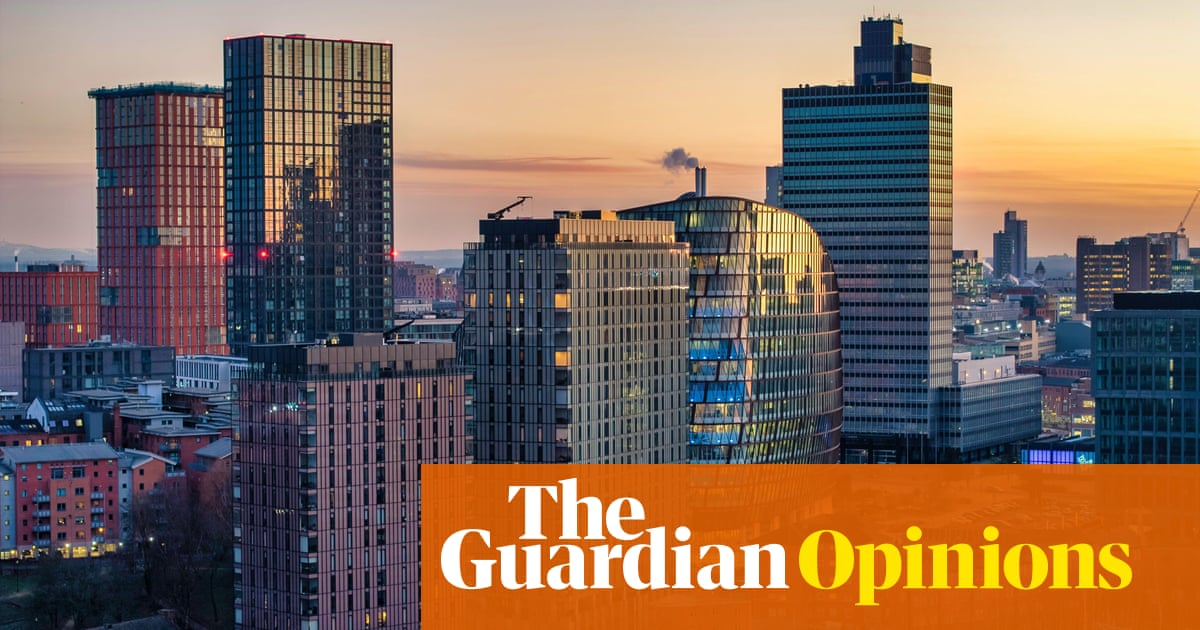This morning I will launch my campaign for a third term as mayor of Greater Manchester with a manifesto which is by far the most radical yet.
For those who have hitherto been sceptical of English devolution, hopefully our recent successful reregulation of buses will have convinced the doubters.
Now, on the back of that, Greater Manchester is ready to take on three other issues which Westminster has either neglected or got badly wrong: housing, technical education and benefits.
When Boris Johnson set levelling up as the driving mission of this parliament, I don’t think he was setting out to expose the shortcomings of the over-centralised British state. But it is exactly what his knack for superficial sloganeering has done.
Over the last five years, we have all watched as the centre has struggled with something it is neither structured nor culturally suited to deliver – a failure laid bare by the Guardian in recent days. Put simply, you can’t level up from the top down.
I know there are many people in Whitehall and Westminster who would like to put the levelling up genie back in the bottle. But regional inequality in the UK is finally a top order political issue. There is no going back from that – and it was good to see Labour say as much last week.
In Greater Manchester, we know that to close the gap with London and the south-east, we must first fix the fundamentals that were broken up in 1980s, 1990s and 2000s. That means breaking out of the Westminster consensus and pioneering very different approaches to the ones that have prevailed for decades at a national level.
Taking confidence from what we have done with public transport, my new manifesto is based around three big ideas: GM Housing First, the Greater Manchester baccalaureate; and Live Well.
On housing, we are clear on two things: first, our residents can’t have a good life or good health without the foundation of a good, secure home; second, overly focusing on policies to promote owner occupation, as Westminster has traditionally done, will never solve the housing crisis.
So we are ready to designate Greater Manchester as the UK’s “housing first” city-region and take action on multiple levels to give people better homes.
We will introduce a new Greater Manchester Good Landlord Charter to give greater recognition to the many landlords in the city-region who try to do the right thing, but also identify more clearly those who don’t. We will empower residents who are stuck in substandard rented homes by giving them a new right to request a property check. If homes are found to be a risk to their health and safety, we will not hesitate to serve improvement notices or use compulsory purchase powers. The days of landlords renting out homes without any regard for the residents within them, or the communities around them, are most certainly coming to an end.
Alongside this, we will build a new generation of 30,000 net zero council homes that are cheaper to rent and cheaper to run. Overall, our mission will be to bring new energy to solving Greater Manchester’s housing crisis within a 15-year period and we will be seeking backing from the incoming government to show that it can be done.
On education, we know that the Westminster obsession with the university route is unfairly limiting the life chances of the two-thirds of young people in our city-region who are looking for something different. So, from this September, using powers granted to us in the Trailblazer devolution deal, we will introduce the Greater Manchester baccalaureate – or MBacc – as an equal alternative to the university route and build it up through the academic years towards the end of the decade.
Finally, we realise that life has changed for our residents and many are struggling with the pressures of daily life. When we look at the benefits system, we see a distrustful deficit model which only succeeds in making people feel worse about themselves and leaves them further away from the workplace. So we will seek to expand our emerging Live Well service, providing everyday support for people in our communities, by making the case for substantial devolution of the Department for Work and Pensions support budget.
We would bring that support, with existing social prescribing services in primary care, and create a unified Live Well service. We would seek to turn the Jobcentre Plus estate into Live Well centres, bringing in support from our local community and voluntary sectors.
At a time when nothing seems to work and the country is going backwards, it is England’s devolved authorities which are bringing in the new thinking.
And there is growing evidence to show that devolution is working. In recent times, Greater Manchester has been growing faster than the UK economy – a story reflected in the city’s changing skyline – and it is predicted to continue to do so in the years ahead. That this has been achieved with only a modest amount of devolved power should give everyone confidence to go much faster and much deeper.
That is why these mayoral elections represent a defining moment for English devolution. People can see that things are not working. The country is crying out for something different. It is time for Whitehall to let go.







